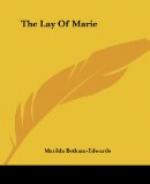with due solemnity, near the tomb of his father, at
the moment he should learn the secret of his birth,
and the miseries produced by it. She would then
see the first use to which her boy would put it.
The prince had nearly spent his last breath in the
service of his beloved mistress; he could only instruct
her by signs to put on a magnificent robe which lay
near him, and hasten her departure. She staggered
through the town, arrived in the solitary fields, heard
the distant knell announce her lover’s death,
and sunk exhausted to the ground. At length the
air revived her; she slowly renewed her journey, and
returned to her castle, which, by virtue of her ring,
she entered undisturbed. Till the birth of her
son, and from that time to the conclusion of his education,
she lived in silent anguish, and in patient expectation
of the day of vengeance. The young Ywonec, by
his beauty and address, recalled to her mind the loved
image of his father; and at length she beheld him,
with a throbbing heart, invested, amidst the applause
of all the spectators, with the dignity of knighthood.
The hour of retribution was now fast approaching.
At the feast of St. Aaron, in the same year, the baron
was summoned with his family to Caerleon, where the
festival was held with great solemnity. In the
course of their journey they stopped for the night
in a spacious abbey, where they were received with
the greatest hospitality. The good abbot, for
the purpose of detaining his guests another day, exhibited
to them the whole of the apartments, the dormitory,
the refectory, and the chapter-house, in which they
beheld a vast sepulchral monument, covered with a superb
pall, fringed with gold, and surrounded by twenty waxen
tapers in golden candlesticks, while a vast silver
censer, constantly burning, filled the air with fumes
of incense. The guests naturally inquired concerning
the name and quality of the person who reposed in that
splendid tomb; and were told it was the late king
of that country; the best, the handsomest, the wisest,
the most courteous and liberal of mankind; that he
was treacherously slain at Caerwent, for his love to
the lady of that castle; that since his death his
subjects had respected his dying injunctions, and
reserved the crown for a son, whose arrival they still
expected with much anxiety. On hearing this story
the lady cried aloud to Ywonec, “Fair son, thou
hast heard how Providence hath conducted us hither.
Here lies thy father whom this old man slew with felony.
I now put into thy hands the sword of thy sire; I
have kept it long enough.” She then proceeded
to tell him the sad adventure of his birth, and, having
with much difficulty concluded the recital, fell dead
on the tomb of her husband. Ywonec, almost frantic
with grief and horror, instantly sacrificed his hoary
stepfather to the manes of his parents, and having
caused his mother to be interred with suitable honours,
accepted from his subjects the crown they had reserved
for the representative of a long line of royal ancestors.




